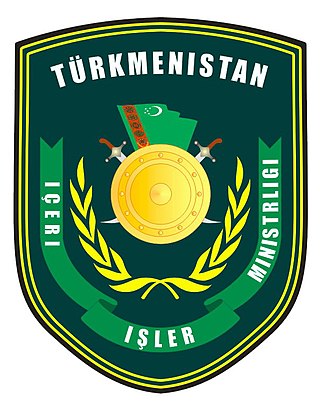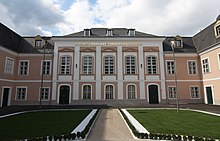
The Council of Europe is an international organisation with the goal of upholding human rights, democracy and the rule of law in Europe. Founded in 1949, it brings together 46 member states with a population of approximately 675 million as of 2023; it operates with an annual budget of approximately 500 million euros.
Transparency International e.V. (TI) is a German registered association founded in 1993 by former employees of the World Bank. Based in Berlin, its nonprofit and non-governmental purpose is to take action to combat global corruption with civil societal anti-corruption measures and to prevent criminal activities arising from corruption. Its most notable publications include the Global Corruption Barometer and the Corruption Perceptions Index. Transparency International serves as an umbrella organization. From 1993 to today, its membership has grown from a few individuals to more than 100 national chapters, which engage in fighting perceived corruption in their home countries. TI is a member of G20 Think Tanks, UNESCO Consultative Status, United Nations Global Compact, Sustainable Development Solutions Network and shares the goals of peace, justice, strong institutions and partnerships of the United Nations Sustainable Development Group (UNSDG). TI is a social partner of Global Alliance in Management Education. TI confirmed the dis-accreditation of the national chapter of United States of America in 2017.

Laxenburg is a market town in the district of Mödling, in the Austrian state of Lower Austria. Located about 20 km (12 mi) south of the Austrian capital Vienna, it is chiefly known for the Laxenburg castles, which, beside Schönbrunn, served as the most important summer retreat of the Habsburg monarchs.

The Vienna International Centre (VIC) is the campus and building complex hosting the United Nations Office at Vienna. It is colloquially also known as UNO City.

The Group of States against Corruption is the Council of Europe's anti-corruption monitoring body with its headquarters in Strasbourg (France). It was established in 1999 as an enlarged partial agreement by 17 Council of Europe member states.
Law enforcement in Azerbaijan comes under the control of the Ministry of Internal Affairs of Azerbaijan, which administers the National Police of the Republic of Azerbaijan. Admitted to the Organization for Security and Co-operation in Europe (OSCE) on 30 January 1992, with an OSCE office opening in Baku on 16 November 1999. It is a member of INTERPOL.

The International Criminal Police Organization – INTERPOL, commonly known as Interpol, is an international organization that facilitates worldwide police cooperation and crime control. It is the world's largest international police organization. It is headquartered in Lyon, France, with seven regional bureaus worldwide, and a National Central Bureau in all 196 member states.

Thomas Stelzer is an Austrian diplomat, who served as the Dean and Executive Secretary of the International Anti-Corruption Academy (IACA) until July 2023, when he was suspended by the IACA board on suspicion of corruption.
Smokin Wanjala is a Kenyan lawyer and a justice of the Supreme Court of Kenya. He holds a Ph.D. in law from the University of Ghent, Belgium. He also holds a Master of Laws degree from the Columbia University in the United States and a Bachelor of Laws (LLB) degree from the University of Nairobi. Wanjala lectured at the University of Nairobi for 15 years, teaching international law, international human rights law, land law and criminal law.

The Ministry of Internal Affairs is the interior ministry or national police force of Turkmenistan. The ministry directly controls the Turkmen police force, consisting of about 25,000 personnel and works with the Ministry for National Security on matters of law enforcement and national defense. The primary tasks of the police force include maintaining law and public security, crime prevention and investigation, passport controlroad and fire safety, and international cooperation in law enforcement. The ministry works with INTERPOL. The current minister is Muhammet Hydyrow. The ministry was founded on February 19, 1998, by decree of President Saparmurat Niyazov “On the formation of the police of Turkmenistan”.

Corruption in Lithuania describes the prevention and occurrence of corruption in Lithuania.

Corruption in Switzerland describes the prevention and occurrence of corruption in Switzerland.
Ekpo Una Owo Nta is a Nigerian lawyer and Chairman of the Independent Corrupt Practices and Other Related Offences Commission (ICPC).

There is evidence that corruption is a legitimate problem in Israeli politics and many investigations have taken place into allegations of influence peddling and bribery.

Corruption in Turkmenistan is a widespread issue, with Turkmenistan being ranked as 19th most corrupt country by the Corruption Perceptions Index.

Caviar diplomacy is a lobbying strategy of Azerbaijan, consisting of costly invitations to foreign politicians and employees of international organizations to Azerbaijan at the expense of the host country. Caviar diplomacy also includes expensive gifts presented as "a tribute to the Eastern tradition."
Vusal Huseynov is an Azerbaijani public official who serves as the Chief of State Migration Service of the Republic of Azerbaijan since 23 April 2018

The Palais Kaunitz-Wittgenstein is a Baroque palace built in 1703 in Laxenburg, Lower Austria. Initially used as a summer residence, the palace also served as a museum, an educational institute, and a community center. Since 2010 the palace is the headquarters of the International Anti-Corruption Academy (IACA).
Anti-corruption comprises activities that oppose or inhibit corruption. Just as corruption takes many forms, anti-corruption efforts vary in scope and in strategy. A general distinction between preventive and reactive measures is sometimes drawn. In such framework, investigative authorities and their attempts to unveil corrupt practices would be considered reactive, while education on the negative impact of corruption, or firm-internal compliance programs are classified as the former.

Armenia–OSCE relations began when Armenia joined the OSCE's predecessor, the Conference on Security and Cooperation in Europe (CSCE), on 30 January 1992. The CSCE transformed into the Organization for Security and Co-operation in Europe (OSCE) shortly afterwards in 1995.
















